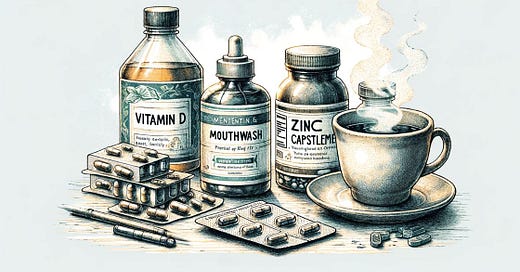Hey everyone,
'It's that time of year again: holiday parties, traveling, gift-buying stress, late nights, and seasonal weather changes... All coming together to make this the season for respiratory infections.
I had bought into the narrative that there wasn't anything you could do for a virus. They are inevitable. If you get sick, you just ride it out and drink some hot tea.
It turns out that there is quite a lot of research on what works - and what doesn't work - for respiratory illnesses like colds and the flu. Who knew?
First off, I didn't realize that adults typically experience viral infections about five times a year, with children encountering them even more frequently. These viruses may replicate for a bit in our noses or throats, but then our immune system usually takes care of them. More than half the time we don't end up even knowing they were there. Additionally, genetics plays a big role in an individual's susceptibility to specific viruses.
Also, I didn't realize that there are quite a few natural supplements and straightforward changes that have high-quality research showing they actually work for reducing symptoms and shortening the duration of illnesses. For example, short nights with less than 6 hours of sleep increase the risk of a cold 4-fold, and gargling or nasal rinsing reduces the odds of even getting a cold or Covid by around 40%. (Gargling also reduces the risk of spreading viruses, and your fellow holiday travelers would appreciate not getting sick.)
I'll let you read the article below for all the other ways to avoid getting sick this holiday season.
Stay well and have a Merry Christmas!
~ Debbie
Avoiding getting sick: Research-backed ways to prevent Covid, colds, and flu
Key takeaways:
~Everyone is exposed to viruses that cause respiratory illness, but not everyone develops symptoms.
~ There are research-backed ways to both prevent colds and respiratory illnesses and reduce symptoms when you do get sick.
~ Genetics affects whether you are likely to get sick from certain viruses.
Looking for Christmas gift ideas?
Did you know that you can gift a Genetic Lifehacks membership?
Just select the membership you want to purchase and check the "Is this a gift?" box when you check out. When you finish checking out, you'll be given the option to email the gift membership to the recipient.
Use the coupon code Holiday10 for 10% off all memberships.
What I've been reading:
This is an interesting study using genetics and patient data to try to determine the link between aspirin use and the prevention of endometrial cancers. I have to be honest in that I don't totally understand the study, but I wanted to share it in case anyone is interested. The conclusion was that taking aspirin significantly reduces the risk of endometrial cancer and that the effect of aspirin is causal. That part wasn't surprising (aspirin reduces the risk of a couple of types of cancer). What I'm not fully understanding, and may be wrong about, is that their results show that aspirin use reduces the risk of endometrial cancer by something like 99%.
2) How much should you exercise to live longer?
A study that started in the 70s involving twin pairs in Finland attempts to answer the question of how much exercise influences longevity. The results showed a meager 7% lower risk of total mortality for people who were physically active vs. people who were sedentary. The researchers were attempting to figure out which leisure-time physical activity was best for increasing lifespan. The biological age tests showed a U-shaped curve, with highly active and sedentary both showing up as older biologically. The moderately active and active groups were best off for biological age. The 7% reduction in all-cause mortality was seen in those reaching a minimum amount of activity - with no benefit for higher activity levels. Not what I was expecting.





